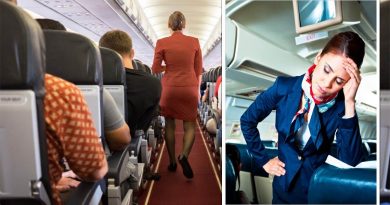Flight attendants union chief Sara Nelson on the end of the mask mandate: Travel Weekly
Association of Flight Attendants-CWA president Sara Nelson has been a key voice during the pandemic in the push against unruly in-flight behavior. Airlines editor Robert Silk recently caught up with Nelson to discuss the impact of the end of the federal mask mandate as well as the association’s other priorities, including its effort to unionize Delta flight attendants.
Q: How are things going on planes since the mask mandate ended?
A: You’re going to hear the numbers drop on unruly. Unruly means someone refused to comply with an instruction, but they’re not necessarily going to the next level of conflict. So, the numbers are going to drop simply because there’s one less federal instruction that flight attendants have to give that someone can refuse to comply with. In terms of disruptive passengers and the violent attacks, almost all of those had nothing to do with masks, and we’ve still had events happening since the mask mandate was dropped. So, there’s still a lot more work to do. And the FAA knows that, which is why they announced the very next day that the zero-tolerance policy was now permanent. Because they know very well, looking at the numbers, that these violent outbursts and really risky behavior do not have to do with masks at all, even though that’s the narrative that was driven by people like Sen. Ted Cruz.
Q: What are the causes, then?
A: The pandemic. People being stressed out, not wanting to follow any kinds of rules at all. We have a lot more work to do with people who don’t fly very often, which is mostly leisure travel. And what that means is just that people who don’t do it very often may have a certain set of expectations. We’ve got only so much staff. And when you can’t resolve those issues, little issues become big issues very fast. The other thing that we see behind a lot of these outbursts is racially motivated or homophobic reactions and slurs or sexist slurs. What we seem to be seeing is the narrative that we’re seeing around the country. We’re at odds with each other.
Q: So, is this driven by politics?
A: I hate to just assign politics to that, because I was brought up to believe that politics are what you use to actually solve problems. Politics has taken on a different tone and different meaning in this environment, and it is definitely political leaders who have purposely put it at odds and have misled people every chance they get, and all the negative ads work. So, yeah, it’s the tone-setting in society, mostly by political leaders.
Q: Do you still expect conflicts over masks? If someone asks their neighbor to put one on as a courtesy, if they’re immunocompromised, for example.
A: Yes. There’s an issue of common courtesy, and people need to come to the plane with the spirit of we’re all in this together, because people can’t walk away. You can’t just leave the building.
Q: Can you update me on the status of the association’s Delta union drive?
A: We never get specific on union drives, but the momentum on the campaign is huge. I think that’s why you saw the response from Delta announcing that they would pay boarding pay. [In June, Delta will become the first U.S. airline to pay flight attendants for the boarding process.] It is mostly being driven by the next generation. We’re on track to file this year.
Q: What does filing require?
A: Physical cards have to be collected. Those signatures are good for a year. And you can only trigger an election with the majority of the workforce.
Q: Last fall, the FAA wrote a draft rule, pursuant to a 2018 congressional mandate, that would extend the mandatory rest period between shifts for flight attendants from nine hours to 10 hours. Do you have a sense of when that will be finalized?
A: There was a 60-day comment period that closed on Jan. 3. The FAA has concluded review of the comments and has sent the final rule to OIRA [the Office of Information and Regulatory Affairs, a division of the Office of Management and Budget] for a final review. As soon as OIRA dockets it — and to be clear, we don’t see that on the docket yet — we can expect we’ll have a final rule in no more than 90 days, and it can’t come soon enough.
Source: Read Full Article




